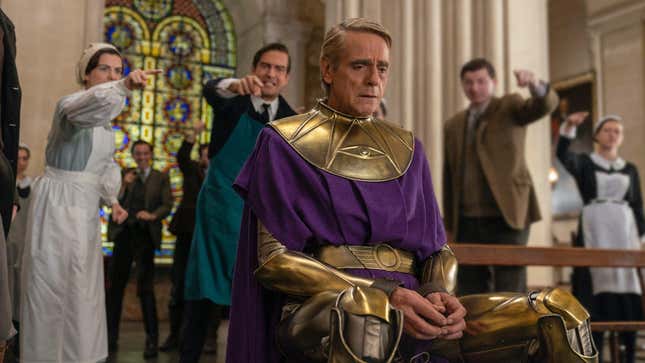
Despite Spider-Man: No Way Home: The More Fun Stuff Version swinging into theaters last month, Watchmen author Alan Moore still isn’t a fan of superheroes. Speaking to The Guardian last week, Moore spoke with his typical candor, bluntly saying that our cultural obsession with superheroes “can very often be a precursor to fascism.”
“I said round about 2011 that I thought that it had serious and worrying implications for the future if millions of adults were queueing up to see Batman movies,” Moore said. “Because that kind of infantilisation—that urge towards simpler times, simpler realities—that can very often be a precursor to fascism.” His proof? Most of the biggest movies in the world were superhero movies.
He wouldn’t be the first to notice the number of backsliding democracies and the rise of authoritarian governments around the world starting in the mid-2010s. Though correlation does not imply causation, Moore’s assessment very much lines up with his writing in the genre. Watchmen made a Comic-Con favorite out of the fascist superhero Rorschach, who many read as a criticism of Batman. Meanwhile, V For Vendetta’s V is perhaps the most famous anarchist in comics history.
Moore’s comments also have deep precedent within Moore’s public statements, which are frequently about how superheroes have screwed up a lot of brains. For example, in 2014, he warned Pádraig Ó Méalóid at Slovobooks of a similar infantilization. He writes:
To my mind, this embracing of what were unambiguously children’s characters at their mid-20th century inception seems to indicate a retreat from the admittedly overwhelming complexities of modern existence. It looks to me very much like a significant section of the public, having given up on attempting to understand the reality they are actually living in, have instead reasoned that they might at least be able to comprehend the sprawling, meaningless, but at-least-still-finite ‘universes’ presented by DC or Marvel Comics. I would also observe that it is, potentially, culturally catastrophic to have the ephemera of a previous century squatting possessively on the cultural stage and refusing to allow this surely unprecedented era to develop a culture of its own, relevant and sufficient to its times.
Moore remained consistent with his view in 2019 when he told The Guardian that the term “graphic novel” was created to “validate [adults] continued love of Green Lantern or Spider-Man without appearing in some way emotionally subnormal. We’d ask Moore never to change, but it doesn’t sound like he ever will.
Unfortunately, while Alan Moore is still in the business of delivering piping hot takes on the comics industry and our own crumbling culture, he is definitely out of the comic book business. “I’m definitely done with comics,” he said. “I will always love and adore the comics medium, but the comics industry and all of the stuff attached to it just became unbearable.”
Fair enough.